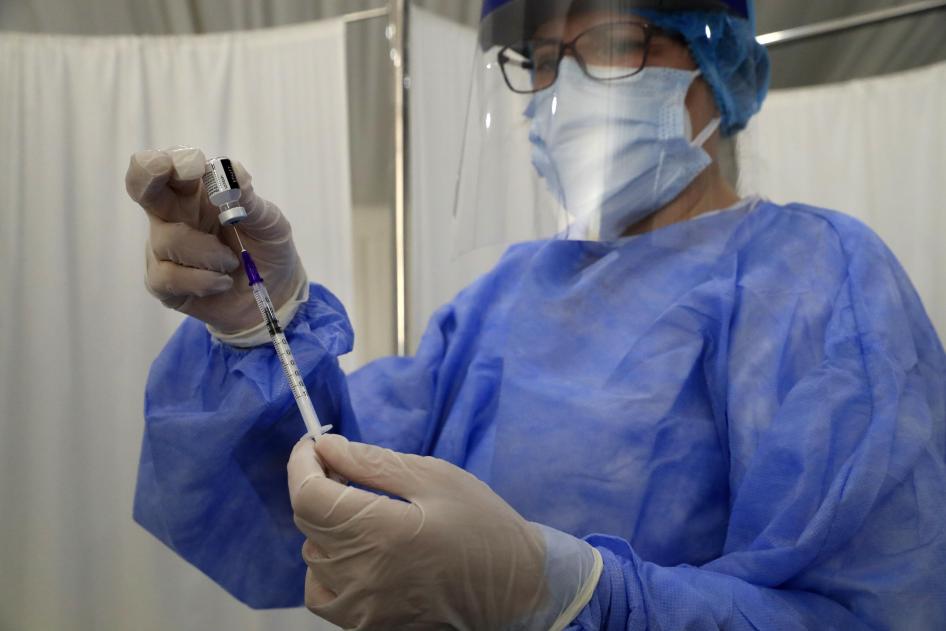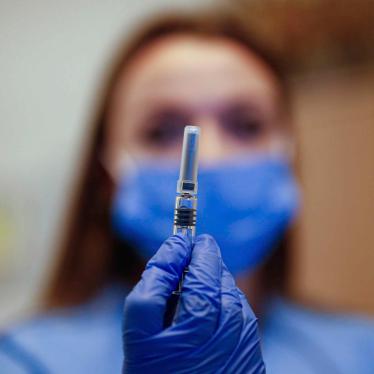French President Emmanuel Macron has taken a major step forward in combatting the global pandemic. After weeks of wavering, he announced that, like U.S. President Joe Biden, he supports a temporary waiver of some parts of the Trade-Related Aspects of Intellectual Property Rights (TRIPS) agreement to confront the COVID-19 pandemic.
Macron’s announcement, ahead of the G7 Summit in the U.K., comes on the heels of the European Parliament adopting a resolution that backs the waiver too. In making their support for this idea public, both Macron and the European Parliament challenge the European Commission’s current approach to tackling the global inequities in access to the health products needed to address the COVID-19 pandemic.
This is exactly what the Commission has been trying to avoid since the proposal was put forward by India and South Africa at the World Trade Organization (WTO) in October 2020. Yes, the Commission has repeatedly talked about making vaccines a “global public good,” but in its actions, it has done precisely the opposite, blocking progress for eight months, dragging its feet at eleven meetings of the TRIPS Council and criticizing the idea at every opportunity.
Some European leaders, including Spanish Prime Minister Pedro Sánchez and hundreds of lawmakers from across the Continent, have been campaigning for the TRIPS waiver. Now, with this week’s resolution from Strasbourg, a majority of the European Parliament is on the record, boldly urging “support” for the waiver. This boost from Macron and the European Parliament is all the more important as discussions at the WTO in Geneva finally move into the text-based negotiations phase.
Facing mounting criticism that its protectionist approach is deepening global inequality, the European Commission sent two “communications” on the subject. It announced that it will soon put forward an “elaborated” new text at the WTO that it claims will do a better job at expanding access to COVID-19 vaccines and treatments than the waiver. This ploy, which recycles the status quo as if it’s a new contribution, shouldn’t fool us.
The first part of the European Commission’s latest gambit is a push to relax export restrictions for vaccines and therapeutics. While European leaders like Macron have spotlighted U.S. and U.K. export controls as problematic, Europe, which boasts that it exports half of its COVID-19 vaccine production, has also imposed its own export restrictions.
Moreover, the Commission’s own data from March shows that European exports have predominately gone to wealthy countries, including Canada, Japan and Saudi Arabia. So although a global commitment to lift export restrictions may alleviate some current production problems, ultimately these measures only redistribute scarce supplies and do little to overcome the shortages themselves, especially in the developing world. The TRIPS waiver, on the other hand, would equip governments to expand production of raw materials, components and vaccines.
The second element of the Commission’s alternative is an appeal to pharmaceutical companies to engage in more partnerships for vaccine production. Despite many attempts to push them in this direction, to date, industry-led exclusive deals have left us with shortfalls and delays.
In response, the World Health Organization’s Bruce Aylward said the EU’s plan “doesn’t go far enough” and that by reinforcing what’s already available, it relies on voluntary measures that “have not served us so far.” The EU and the U.S. will soon be launching a joint “manufacturing and supply chain taskforce,” which will give this effort an important political boost. But without a waiver, intellectual property claims will remain a hurdle. Factories in Europe and around the world, from Bangladesh to Israel, have raised their hands to say they’re willing and able to produce vaccines, but they haven’t been able to, as no one is willing to share the recipe.
Promises to streamline compulsory licensing systems, the third element in the Commission’s alternative, are an empty shell. Eighteen months into a pandemic that has devastated the world and is mutating into even more aggressive variants, a mere restatement of principles that are already on paper is far too little, too late.
The EU suggests, for example, making a declaration confirming that the ongoing pandemic qualifies as an emergency that warrants using compulsory licensing. But no one needs the EU or the WTO to tell us the ongoing pandemic is actually an emergency. This is self-evident. More importantly, since compulsory licensing primarily covers patents and requires issuing licenses product-by-product, it is inadequate on its own. As the European Commission President herself recognized, patents don’t tell the whole story.
Finally, the EU touts its donations to COVAX, the global COVID-19 vaccine procurement facility, to suggest that it is doing everything it can. But neither dose-sharing nor COVAX will be enough to deliver universal and equitable vaccine access. COVAX has always acknowledged that it can only hope to cover a fraction of the populations in the countries it serves, leaving a gap between its target and the estimated thresholds for herd immunity. COVAX also faces serious supply shortfalls, which means that it has only been able to deliver 81 million doses to 129 countries, barely accounting for 1 percent of those countries’ populations.
Taking all its elements together, the European Commission’s gambit offers nothing new. Its arguments are merely attempts to recycle the same old obstructionist policy, and they fool no one. For months, global health experts, over one hundred governments, the Pope, the Dalai Lama, the head of the World Health Organization, former heads of state and government, Nobel prize winners and 2.7 million petitioners have been pushing for the TRIPS waiver. Now, Macron and the European Parliament have sided with them over the Commission.
To be sure, everyone who has been supporting the waiver knows it would not expand production overnight. But it would ease complex rules, eliminate the risk of trade-based retaliation and litigation and pave the way for better collaboration to transfer technologies and scale up manufacturing. If the EU acts on its international legal obligations of cooperation and agrees to the waiver, with time, it would help overcome the shortage of COVID-19 vaccines and other medical products. These shortages today continue to impair people’s enjoyment of their fundamental human rights to life, health and a decent standard of living. In short, the waiver would help end the global pandemic more quickly.
The talks in Geneva will be long and difficult, and, of course, their result will come too late for the millions who were infected while diplomats debated. But with Macron throwing his weight behind the waiver, we finally could be on the road to saving millions of others.









